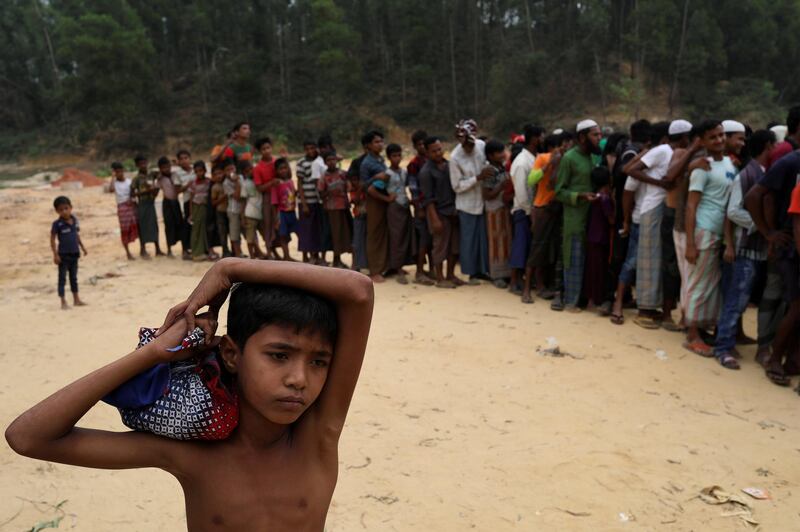Bangladesh and Myanmar have agreed to involve the UN refugee agency to safely repatriate hundreds of thousands of Rohingya Muslims who had fled violence in Myanmar, the Bangladesh foreign minister said on Saturday.
More than 600,000 Rohingya have fled to Bangladesh from their villages in northern Rakhine state after the Myanmar military launched a brutal counter-insurgency operation in response to attacks by Rohingya militants on an army base and police posts on August 25.
Faced with a burgeoning humanitarian crisis, Bangladesh and Myanmar signed a pact on Thursday agreeing that the return of the Rohingya should start in two months.
Uncertainty over whether the United Nations High Commissioner for Refugees (UNHCR) would have a role had prompted rights groups to insist that outside monitors were needed to safeguard the Rohingya's return.
Addressing a news conference in Dhaka, Bangladesh foreign minister Abul Hassan Mahmood Ali gave assurances that the UNHCR would play some part.
"Both countries agreed to take help from the UNHCR in the Rohingya repatriation process," Mr Ali said. "Myanmar will take its assistance as per their requirement."
The diplomatic breakthrough comes just before Pope Francis begins a visit to Myanmar and Bangladesh that is aimed at promoting "reconciliation, forgiveness and peace".
While the violence in Rakhine has mostly ceased, Rohingya have continued to stream out of Myanmar, saying they have largely lost access to sources of livelihood such as their farms, fisheries and markets.
Thousands of Rohingya, most of them old people, women and children, remain stranded on beaches near the border, waiting for a boat to take them to Bangladesh.
_______________
Read more:
[ Myanmar buckles under international pressure and allows Rohingya to come back ]
[ US calls Myanmar's treatment of Rohingya 'ethnic cleansing' ]
[ UAE medical team in Bangladesh to help Rohingya refugees ]
_______________
Mr Ali said a joint working group, to be formed within three weeks, would fix the final terms for the repatriation process to begin.
After leaving the refugee camps in Bangladesh, Rohingya who opt to be voluntarily repatriated will be moved to makeshift camps in Myanmar near to their abandoned homes, he said.
"Homes have been burnt to the ground in Rakhine that need to be rebuilt. We have proposed Myanmar to take help from India and China for building camps for them," the minister said.
The UN and United States have described the Myanmar military's actions as "ethnic cleansing", and rights groups have accused the security forces of committing atrocities, including mass rape, arson and killings.
The United States also warned it could impose sanctions on individuals responsible for alleged abuses.
Led by Nobel prize winner Aung San Suu Kyi, Myanmar is in the early stages of a transition to democracy after decades of military rule. But civilian government is less than two years old, and still shares power with the generals, who retain autonomy over matters of defence, security and borders.
The commander of Myanmar's armed forces, Senior General Min Aung Hlaing, has denied that soldiers committed any atrocities.
Under the deal struck with Bangladesh, Myanmar will take measures to see that the returnees will not be settled in temporary places for a long time and will issue them identity cards for national verification immediately on their return, Mr Ali said.
But Rohingya activist Mohammad Zubair said they "will never agree to voluntary repatriation if they are not taken back to their villages and their land returned to them".
He said Bangladesh and Myanmar signed a similar repatriation agreement in 1992, which led to the return of some 200,000 Rohingya to Rakhine, but unresolved problems, including the issue of citizenship, continue to fester.
The stateless Rohingya have been systematically oppressed by Myanmar, which has stripped the minority of citizenship and severely restricts their movement, as well as their access to basic services.
Myanmar's government says Rohingya are interlopers from Muslim-majority Bangladesh, even though many can trace their roots in Myanmar back generations.
"Unless we get citizenship in Myanmar, no way the Rohingya will this time return to Rakhine," Mr Zubair said.
There were already nearly 400,000 Rohingya refugees in Bangladesh before the latest exodus, and the Bangladesh foreign minister said they could also be considered for the repatriation, under the terms of the agreement.
Impoverished and overcrowded, Bangladesh has won international praise for allowing the refugees into the country, but has imposed restrictions on their movement and said it does not want them to stay.
The agreement has already drawn criticism at home, with the main opposition party saying "taking steps to repatriate Rohingyas without stopping repression and genocide in their homeland will be tantamount to pushing them to the hell".





